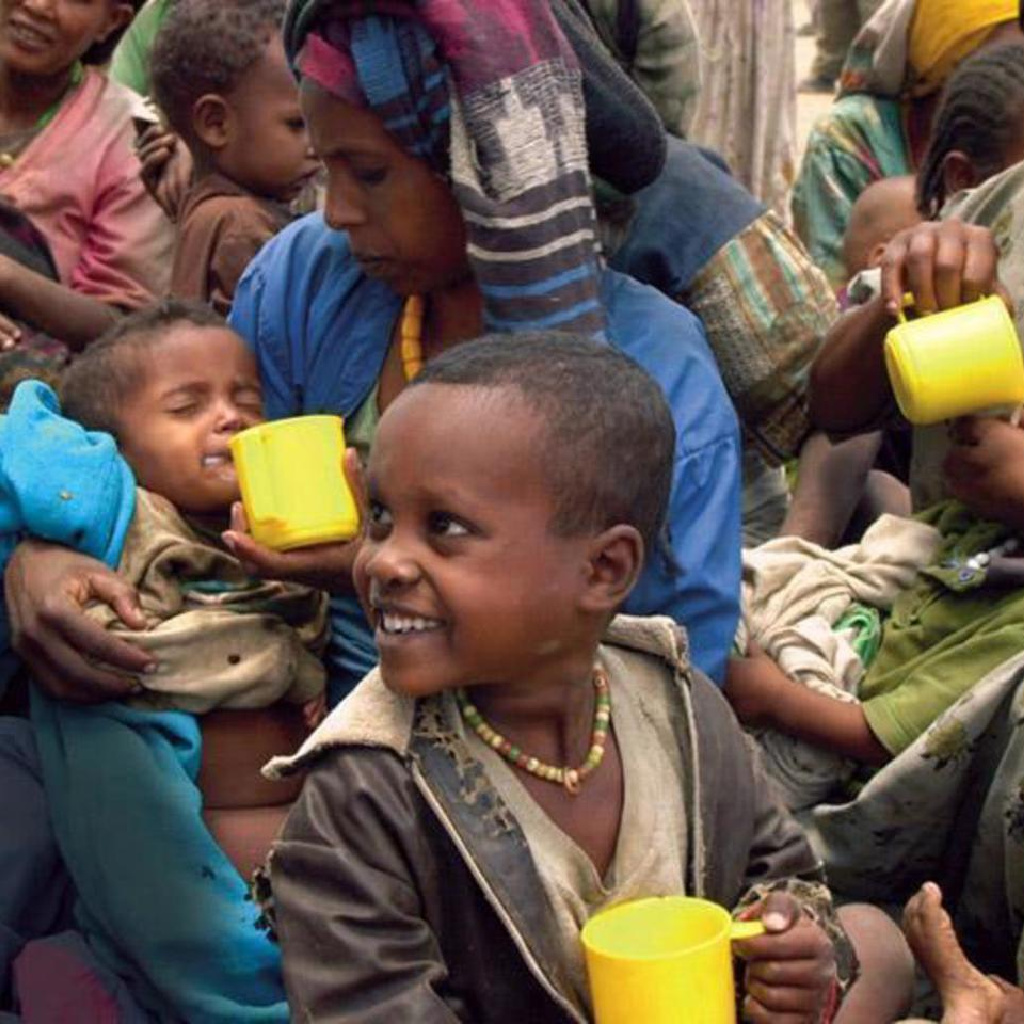Catholic Community Services of Utah has been serving the Wasatch front since 1945 by helping more vulnerable populations gain access to services. Part of their work includes assisting with refugee resettlement and immigration. The number of refugees resettled through Catholic Community Services last year was 850. Our Immigration program serves thousands of clients with their Immigration needs.
There are many people in Utah who are passionate about the issues that plague refugees in moving to a new country. This interview was conducted in hopes that it would help those who are interested gain an idea of the impact they can have, even if they have limited time to volunteer.
Public Square Magazine: Hello, Aden! Thank you so much for taking the time to meet with me. Could you please start by telling me about your program?
Aden Batar: Yes! Hello, my name is Aden Batar, and I’m the director of the migration and refugee services for Catholic Community Services of Utah. This program helps refugees and migrants who are coming to the United States. So, if I start with the refugee resettlement program, every year, we bring more than 600 refugees from war-torn countries to start a new life here in the United States. These are refugees who have been given legal status by the US federal government, and they were allowed to come in. They come from many, many different parts of the world. The majority that we are getting nowadays are Afghan refugees. We are also getting refugees from the Congo, Sudan, Somalia, Syria, and many other parts of the world. We also have been getting a lot of Ukrainian parolees who have been coming through the United for Ukraine program. When these individuals arrive in the United States, we start by getting secure housing for them before they arrive. We fully furnish the housing and make sure they have all the essential furnishings, food, and everything that a family would need to start a new life.
Most of the families arrive in the evening. So, we pick them up from the airport, and a case manager who speaks their language meets them at the airport. We take them to their home, which has pretty much everything. Usually, the families, when they arrive just have whatever they have in their suitcases, that’s all they are bringing with them. When they see this housing set up for them and they have everything, that’s a ‘wow’ moment. So, they are overwhelmed, and most of the time, they say to us, “We weren’t expecting this warm welcome and with all these things.” After that, the next day, we start doing the intake and helping them fill out all the paperwork like applying for food stamps, Medicaid, and financial assistance. Then, we assess the families and where their needs are. If they have medical issues, we get them a medical appointment. Also, we take information about their children so we can enroll them in school.
The first month, there is a lot of assessment and help setting up the basic services that they need. Once they are all complete, they have a home, they have food, and they have their children enrolled in school. Then the second month, we start providing them with an orientation about life in the United States—what to expect, what their rights and responsibilities are, and how to use public transportation. We connect them with volunteers in the community, and we connect them with our job developers who help them with getting a job. Every month, we have services lined up. Our goal is to make sure that everyone gets a job within six months of being in the United States. By then they have their social security, they have their employment documentation, they have their Utah ID, they know how to use public transportation, and all their healthcare needs are being addressed. So they know how to get to the job and how to get back home. While they are getting all their services, our agency helps them pay their bills, utilities, fast pass fees, and whatever needs they have. Then, after we get a job for each family, we teach them how to pay the bills. Usually, I would say at 6 months, families start paying their bills.
Then, we provide case management for up to a year. During that time we make sure that the families are self-sufficient and continue to be self-sufficient and remove any barriers that come in their way. Also, right at the beginning, we enroll them in English as a second language classes so the families will learn how to communicate. And the volunteers also teach them English and basic life skills. Volunteers will be mentoring the family; they will stay with them throughout that year. The children will enroll in public schools. We have a team of youth staff that helps them with school and parent-teacher conferences and is the liaison between the school and parents if there are any issues or need for support.
We also have an immigration program where our staff helps with family unification. If they have left family members behind, we help them fill out paperwork and continue advocating for them until their family members are reunited with them.
Within the first year, we also help families apply for their permanent residency or green card so they can have that permanent residency. Then down the road, when the families reach up to 5 years of residency, when they are ready to apply for citizenship, our emigration program helps them apply. Eventually, the majority of the refugees become US citizens. So we help them through that process with the educational requirement and the paperwork requirement, and then we go with them to the interview. So this is just an overview of all the services that we do with the refugees.
Finally, we have refugee children who arrive without a guardian. So, when these children arrive, the agency takes guardianship. We place them into licensed foster homes, and we supervise them until they reach age 21. They will stay with the family that we placed them in. They will go to school, and we help them with independent living skills to make sure that when they are emancipated from the program, they know how to live on their own.

PSM: Wow! That is very extensive. It seems like you have some case management employees and social workers, and then you also have volunteers. Can you tell me about those different roles? And maybe the roles of volunteers in the long run?
AB: The staff that are paid staff at Catholic Community Services provide all the technical services like case management, employment, and all the other services that are required. The volunteers, however, do mentoring. Every family is assigned a volunteer, either a group of volunteers or an individual volunteer. They basically teach them life skills. Like how to live in an apartment setting. So the volunteers will go into the apartments of the families and show them everything—like how to maintain the apartment, how to clean it, and how the appliances work. Also, they will show them how to pay the bills and what the lease agreement is, and then we go over with them how to have a relationship with their landlord and how to keep their lease agreement. They also teach them how to use public transportation. The volunteers ride the bus with them and show them around. They also help the children with their school homework. They will also teach them English. They will talk to them in English, teach them the language, and how to read and write. Most importantly, the volunteers become friends with the family. A lot of the families do not have anyone, so the volunteers will become friends with them and become someone that the families can call if they need help or have questions. So that plays a really major role and helps with the successful integration of the refugees into the community. The volunteers make a commitment, and we train them before we assign them a family. We have a volunteer coordinator that assigns family. So that is the two different aspects of the staff and the different responsibilities they have.
PSM: It seems like the volunteers play a pretty vital role in this whole program.
AB: Absolutely. I have been working in this program for almost 30 years now, and I have seen the difference the volunteers have been making. Families that we have assigned volunteers have successfully integrated into the community. The majority of their barriers are removed because that volunteer is there for them. Imagine going to a foreign country, and you don’t know anyone. Imagine if you are alone in your apartment and you don’t have anyone that you can call except for a case worker or staff member. Volunteers and staff together help that family successfully integrate into the community.
PSM: Can you tell me more about the time commitment and the process to become a volunteer?
AB: If I start with the process, all they have to do is go to the website ccsutah.org, where they can fill out a volunteer interest form, and then our volunteer coordinator will contact them. There is an orientation that they would have to attend so they could be given information about the program and what opportunities are available. Once they are ready to commit to becoming a volunteer, they will fill out paperwork and do a background check. Background check is a requirement for working with this vulnerable population. Once the check clears, then they are ready to be matched with a family. Then, we would introduce them to the family. The caseworker would go with the volunteer to introduce them to the family and then we just leave them to visit with the family and work together. We will give them some ideas about what services they will provide, but as the volunteers go, they will learn what the families need from them.
The time commitment depends on what availability they have. Some volunteers will say I can only do weekends or a few hours here and there. Some say they could stay with a family for six months or a year. So it depends on what time they have available.
PSM: So it kind of is up to them to give their availability, and then your program uses them within that availability.
AB: Yes, absolutely. We will work with whatever time commitment volunteers can give us.
PSM: There are many people here in Utah who are passionate about refugee work and who may have an hour a week that they can donate. What is the best way for them to have an impact in this area within their time constraints?
AB: We have a lot of volunteer opportunities here at Catholic Community Services. So, for example, if they only have one hour, they could come to the office and work with our case workers and staff. We also have families arriving every week, and we need a home set up. They can go meet the staff at the home we are setting up for an arriving family. Then, they can help set up the apartment. We only have two staff members that work in our warehouse so they can use all the help they can get. That is also another opportunity. They can go to the warehouse and help sort donations for that one hour or whatever they have. We will use whatever time the volunteers have to make a difference in a variety of ways.
PSM: That’s amazing. This program seems awesome. I had no idea about the scope of the work that you do. Thank you for meeting with me. We are so excited to spread awareness about this program, particularly to those people who are passionate about this work and don’t know where to start.
Catholic Community Services of Utah provides many wonderful services for refugees coming into the United States. While assisting in the relocation process can seem daunting to many people who do not know where to start, as Aden conveyed, there are many opportunities to volunteer or donate, which will be immeasurably helpful to their efforts. You can donate furniture to help in the efforts to provide furnished apartments for new families; you can donate time to help set up those homes or assist with case workers; or, if you have more time, you can volunteer to ease a family’s integration into the community. Catholic Community Services may be a great program if one wants to assist in this effort.
















